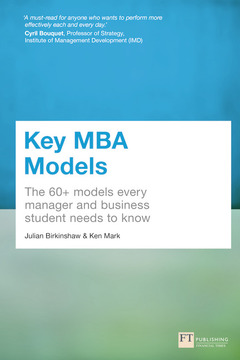Description
Key MBA Models
The 60+ Models Every Manager and Business Student Needs to Know
Authors: Birkinshaw Julian, Mark Ken
Language: English
Subjects for Key MBA Models:
296 p. · Paperback
Description
/li>Contents
/li>Biography
/li>
Key MBA Models is a one-stop-shop for all business course students and practicing managers. It contains the core management models from each business discipline ? from Strategy and Finance to Marketing and Accounting ? and distils them into concise summaries of what they are and how to apply them.
Written by London Business School Professor Julian Birkinshaw, it covers the essential models that all business students and managers need to know. Themed around the course modules on an MBA, the 60+ models fall into the following categories:
- Strategy
- Business Economics
- Finance
- Decision Science
- Accounting
- Operations
- Marketing
- Organisational Behaviour
The term ?model? is used loosely ? in some cases it might be a framework (The 4 Ps of Marketing, Porter?s Five Forces), in some cases it might be an important concept (open innovation or customer orientation), and in some cases it might be a technical model (the Capital Asset Pricing Model).
Built on research with academics from the top international business schools, this book is an essential reference guide for every manager and MBA.
- PART ONE ORGANISATIONAL BEHAVIOUR
- 1 Change management: Kotter’s eight-step model
- 2 Cognitive biases in decision making
- 3 Emotional intelligence
- 4 Managing work groups: Belbin team roles
- 5 Matrix management
- 6 Mintzberg’s managerial roles
- 7 Motivation: Theory X and Theory Y
- 8 Negotiating techniques: BATNA
- 9 Schein’s model of organisational culture
- 10 360-degree assessment
- PART TWO MARKETING
- 11 Customer lifetime value
- 12 Ethnographic market research
- 13 Market orientation
- 14 Multichannel marketing
- 15 Met promoter score
- 16 The 4Ps of marketing
- 17 Pricing strategies: dynamic pricing
- 18 Product life cycle
- 19 Segmentation and personalised marketing
- PART THREE STRATEGY AND ORGANISATION
- 20 The ambidextrous organization
- 21 The BCG growth-share matrix
- 22 Blue ocean strategy
- 23 Core competence and the resource-based view
- 24 Corporate social responsibility: the triple bottom line
- 25 Corporate strategy: parenting advantage
- 26 Five forces analysis
- 27 Game theory: the prisoner’s dilemma
- 28 Generic strategies
- 29 The McKinsey 7S framework
- PART FOUR INNOVATION AND ENTREPRENEURSHIP
- 30 Brainstorming
- 31 Design thinking
- 32 Disruptive innovation
- 33 Greiner’s growth model
- 34 Open innovation
- 35 The seven domains assessment model for entrepreneurs
- 36 Stage/gate model for new product development
- 37 Scenario planning
- PART FIVE ACCOUNTING
- 38 The accrual method in accounting
- 39 Activity-based costing
- 40 The balanced scorecard
- 41 The DuPont identity
- 42 Economic value added
- 43 Ratio analysis
- PART SIX FINANCE
- 44 Black-Scholes options pricing model
- 45 Bond valuation
- 46 Capital asset pricing model
- 47 Capital budgeting
- 48 Modern portfolio theory
- 49 Modigliani-Miller theorem
- 50 Time value of money
- 51 Valuing the firm
- 52 Weighted average cost of capital
- PART SEVEN OPERATIONS
- 53 Agile development
- 54
Julian Birkinshaw is Professor and Chair of Strategy & Entrepreneurship at LBS. He's a Fellow of the British Academy & holds PhD & MBA degrees. He was recently placed 39th on the global “Thinkers 50” list of thought leaders in the field of management. Ken Mark is a businessman, entrepreneur, research & writer. He's written more than 100 case studies for use in MBA classrooms.
These books may interest you

MBA Management Models 220.72 €



